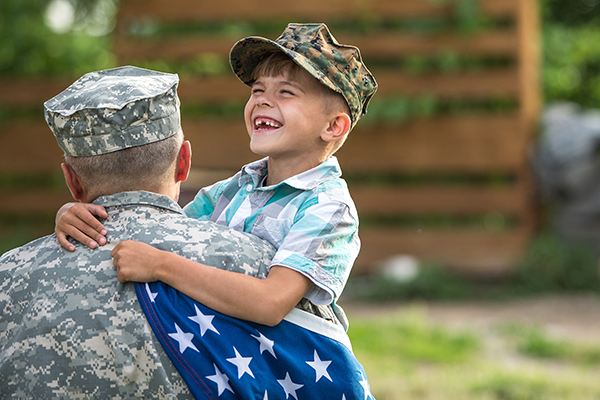
Did you know that San Diego is one of the largest military communities in the nation and that a child growing up in a military family oftentimes experiences 8-10 moves before they turn 18 years old? They must change schools, make new friends and find ways to fit into their new communities.
Through the eyes of a child, they move and change schools more than any other child they know and they think they’re the only ones going through this, even though most attend schools within military housing communities. At Kids’ Turn San Diego, when children walk into our programs, they realize that every child’s family situation is just like theirs. They feel “normal”. When children feel “normal”, they feel like they belong and are more likely to excel in school and have positive peer relationships.

When children and their families transition from military to civilian life, there is joy of reunification and their family finally having some stability but, for some, this quickly turns to feelings of disconnection and an inability to communicate. These transitions are challenging for military families and oftentimes lead to tension and conflict between parents. About 85% of military couples get divorced. When a family breaks up, parents and children of all ages feel helpless, sad, frightened, guilty, and angry.
From the child’s perspective, they could not wait until the day their mommy or daddy was home for good. They thought everything would be great but many children are left sad and don’t understand why parents argue or ignore each other, why they are not playing games or having family dinners, why their parent who was gone for so long, doesn’t want to talk with them or attend their sporting events. They are confused wondering why this parent just sits in front of the TV or is always working on the car or keeps talking to themselves or struggles to walk due to being hurt in combat.
At Kids’ Turn San Diego, our goal is to change family relationships in positive ways so children experiencing family separations and military transitions are happier.
In our programs, both children and their parents participate. Children learn new ways to express their feelings and realize that their parent’s behavior is not their fault, thus freeing them up from blaming themselves. Parents learn communication tools so they are able to put their children first.
A military veteran named Thomas attended our Family Workshop for Separated and Divorced Families. He told us, “I was nicer to my co-parent this week and I changed her contact name from ‘X’ to Carol, then I showed our son. He was so happy. He jumped up and hugged me. Thank you for helping me help Dylan be happy!”
In celebration of “Month of the Military Child”, here are some tips for helping your children feel happier:
• Put your cell phone down and do something fun with your child. For younger children, they like imaginative play so have tea parties or superhero adventures. Children ages 7-12 tend to enjoy board/video games and older children like to listen to music, play video games or to hang out without parents asking questions or giving advice.
• Encourage your children through phrases like “You’re so much fun to be around!”, “Can I put this on the bulletin board at work or on the refrigerator?” or “I’m so lucky to be your parent.”
• Try to catch your child doing something good and say it aloud. “You are such a good big brother/sister”, or “I love how you are teaching your younger sibling how to…” or “I saw that you got an A on your math test, great job!”
• Encourage your child’s relationship with their other parent or grandparents. One way is to help them make birthday cards or Mother’s/Father’s Day cards. Things that are handmade are oftentimes the most treasured gifts we get from others.
• Listen to your children without giving advice or trying to solve their problems.
• Spend time with your children. No matter their age, children need their parents attention. Put down your laptop and cell phone. Your children feel important and cared for when you pay attention to them.
With a mission of “promoting, supporting and securing the well-being of children who are experiencing family separation”, Kids’ Turn San Diego (www.kidsturnsd.org) helps children transition through family separations by empowering them to share their thoughts and feelings and by helping their parents gain insight about the impact of how their behaviors affect their children.
We build resiliency, strengthen self-esteem and create brighter futures for children experiencing family separations, divorce and military transitions.





